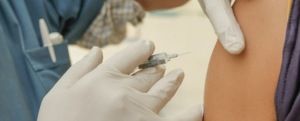News
Science Round-Up: Corona vaccine made available to private sector
This article is more than 4 years old.
Along with lifting all restrictions concerning the virus, the government now passed a decree that allows Johnson&Johnson into private commerce.

Johnson&Johnson only requires one jab which reduces latency until immunity. (photo: Nearshore Americas)
Even with 75.8 percent of the nation fully vaccinated, Denmark still has many doses of Johnson & Johnson left unused.
Available to private sector
Accordingly, since September 1, the doses have been made available to the private sector, thus widening the access – particularly to Danes abroad, such as seamen.
Many in the private sector have already expressed an interest in acquiring the doses, as the J&J’s one-jab-immunity assures a speedy process to vaccinate even more people.
Available to visitors
The new rules also permit people of any nationality to legally buy the doses of J&J whilst in Denmark.
Further information is expected to be announced later this month.
____________________________________________________________________________________
Danes are willing to pay extra for environmentally-friendly motorways
For the sake of nature preservation, Danes are willing to pay a little bit extra to ensure the country’s motorways are entirely fenced off. According to a study carried out by the University of Copenhagen in collaboration with the Danish national road authority, the public believe the fences would reduce the number of deer accidents. The study was conducted in anticipation of the government’s plans to build motorways in Jutland and Zealand.
SDU scientists developed robot capable of human interaction
The robotics lab at the University of Southern Denmark (SDU) has confirmed that it has completed the finishing touches on a robot that can communicate with people. According to Professor Norbert Krüger from SDU the completion is a huge step towards the further use of robots in the workplace. Many companies or hospitals are already reliant on robotic support. SDU’s robot has been programmed to undertake tasks within the care sector. However, its field of duty is expected to grow with its learnings.
Flu vaccination reportedly halves the risk of death by heart congestion
A new study has established that the influenza vaccination is an effective way of treating a patient suffering from heart failure. According to the transnational study, which Denmark was a part of, the vaccination led to a 41 percent reduction in deaths when it was administered to a patient with congestion of the heart. To benefit from the effect, patients must be vaccinated within three days of diagnosis. Dr Ole Frobert believes the vaccination should become a standard part of any treatment
New scanning method promises more accurate diagnosis of brain tumours
A Odense University Hospital study concludes that injecting a child with an amino acid trace element improves the chances of a scan detecting dangerous brain tumours. The injection enables the scan to more accurately distinguish between benign and malignant tumours. Brain tumours are the deadliest kind of tumours among children.
DTU scientists prove Fano laser beam to be superior
A study carried out by scientists at Denmark’s Technical University (DTU) concludes that the Fano laser beam has fundamental advantages in science compared to other types. Just a few micrometres in width, the laser is impossible to spot with the naked eye. The team led by Jesper Mork, head of the photonics department at DTU, feel Fano is particularly suited for use in on-chip communication and neuromorphic computing.










































